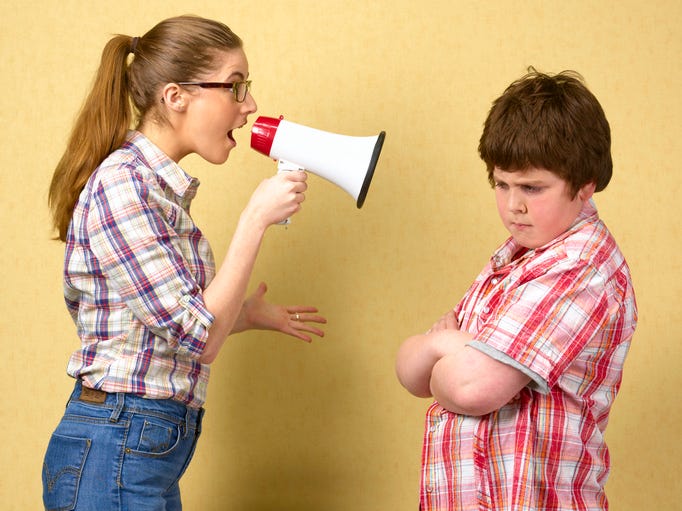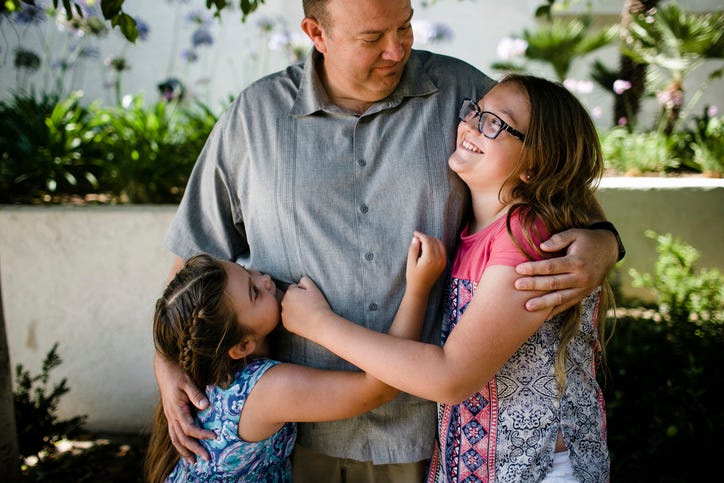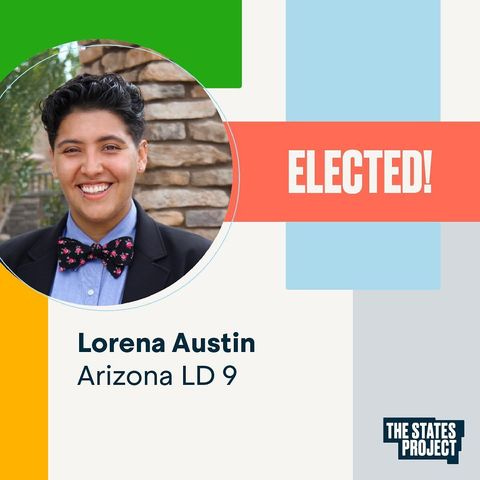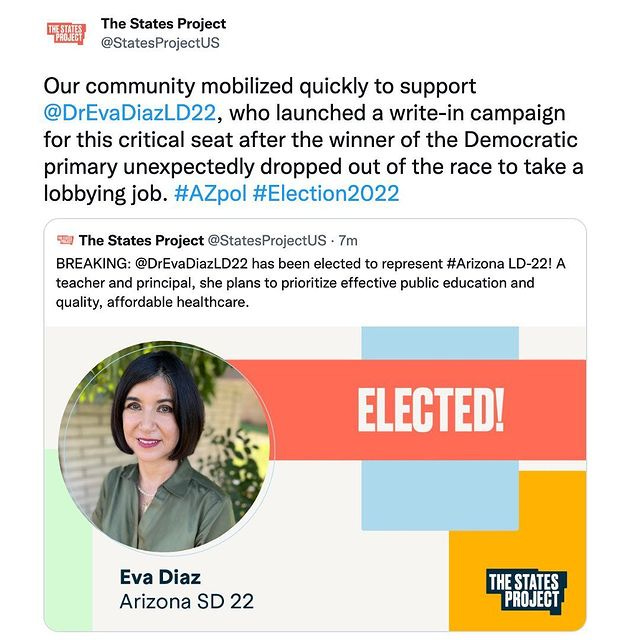“I Wish They Had Just Loved Me Instead of Trying to Fix Me.”
Fat shaming is one of the top reasons kids get bullied. Here's what we do about it.
Before we get into today’s essay, we need to TALK ARIZONA!!! I was holding my breath last week because Arizona is one of the slowest states to count their votes, and as of last Thursday, we still knew basically nothing. And I found myself obsessing slightly about what to say to y’all because I spent the past 10 months convincing so many of you to give dollars to some very local elections in a state most of us do not live in, and honestly why does this matter and could it even work. Over 300 of us raised $28,236 and for what?
WELL, FRIENDS.
It’s still (yes, still!) early for clear results for our close partners in Arizona, but our goal of a tie in the Senate is still on the table. And check out how many of our candidates won!
RE-ELECTED: Rep. Judy Schwiebert, LD-2
RE-ELECTED: Sen. Christine Marsh, LD-4
ELECTED: Representative-elect Laura Terech, LD-4
ELECTED: Senator-elect Eva Burch, LD-9
ELECTED: Representative-elect Lorena Austin, LD-9
RE-ELECTED: Rep. Jennifer Pawlik, LD-13
ELECTED: Representative-elect Eva Diaz, LD-22
This last one is an especially important victory because Eva Diaz was a last-minute write-in after the winner of the Democratic primary unexpectedly dropped out of the race to take a lobbying job. (Unimpressed emoji face.)
You can catch up on all the other state legislature victories (including MICHIGAN OH MY GOD) on The States Project’s website and Instagram. Even though our dollars didn’t go directly to those states, I still feel that we are very much a part of their celebrations — because some of you formed your own Giving Circles to support those efforts, but even more because we all learned so much about the power of state government and now we know why these small wins are honestly, epic.
One last bit of housekeeping: Corinne and I are recording your next Ask Us Anything episode on Wednesday. Drop your questions here! (If you’ve missed these previously, you can find all our old AMA episodes here.)
Ask Virginia: Other Kids Are Calling My Kid “Fat.”
Disclaimer: You’re reading this column because you value my input as a journalist who reports on these issues and therefore has a lot of informed opinions. I’m not a healthcare provider and these responses are not meant to substitute for medical or therapeutic advice. Please also be aware that today’s column includes discussions of overt fatphobia within families and towards children. Take care of yourselves.
Q: My son is 10 years old (in 5th grade) and unfortunately has been dealing with some weight-based teasing among peers. Do you have any resources or recommendations? He got on the elliptical in our basement last night and my heart was just shattering. I want to support him in a body positive, anti-diet way. Thank you so much for all you do!
First: I’m so sorry. I get letters like yours all the time, which is not surprising since research shows that weight is the number one reason girls are bullied and the second most common reason for boys. Of course your heart is shattering. My heart always shatters a little bit too, to think of yet another great kid being told, in this cruel and manipulative way, that their body is their value. And let’s be clear that fat shaming and bullying isn’t just horrible for kids to experience in the moment; it’s linked with lasting harm. Kids who experienced weight-based teasing at the start of a 15 year study were more likely to struggle with poor body image, disordered eating patterns and more well into adulthood. Parents, teachers, coaches, and school administrators need to believe kids when they tell us about fat shaming, take them seriously, and intervene quickly to stop it and prevent long-term damage.
But my heart also shatters to think of yet another great parent now having to figure out how to support their child in a world that makes this so fucking hard. One thing I didn’t understand about parenting until I was in it, is how the experience of watching your child suffer and doubt themselves is actually exquisitely, physically painful.
And yet. We know, when it comes to fat shaming and bullying, that this visceral desire to take away the harm can result in parents who cause more harm. Up to half of youth experience weight-based teasing from family members. (Most of the research on this doesn’t differentiate between parents and other relatives, but I’d argue if say, a sibling is the bully and a parent is not intervening, the parent is also effectively the bully.) Not shockingly, this kind of teasing is most likely to happen in families where parents are already concerned about their kid’s weight, dieting themselves, and/or encouraging their kids to diet. Again, all of this has consequences. Kids who are fat shamed by family members report higher levels of stress and substance abuse and lower self-esteem into young adulthood. And this 2018 analysis of over 2,000 girls found that those who had been labeled “too fat” by age 14 had more disordered eating thoughts and behaviors five years later—and that this relationship “may be most pronounced when the labeling comes from a family member.” The most dangerous call comes from inside the house.
Anna, now 38, from Grand Rapids, Michigan, says that her dad teased her for being fat—and chastised her when she got upset about it—because he was determined to toughen her up after kids at school did the same thing. “He always said that bullies tease to get a reaction, so he wanted me to stop reacting and be less sensitive,” Anna says. “[Both my parents] wanted me to be less ‘bully-able,’ and that just made me feel like more of a freak show.”
Here’s the hard thing: The parents who do this are not monsters. They are desperate to protect their children from the world. But there is virtually no line here between protection and blame. “It’s so important to reinforce to your child that they do NOT need to change,” says Rachel Millner, Psy.D, a psychologist based in Newtown, PA who specializes in eating disorders . “They are NOT the ones with the problem or issue. It’s the bullies who need to do the changing.” Anna agrees: “I wish my parents had been more invested in supporting me.”
It’s not just Anna. I decided to do something a little bit different with my answer for this question. Because I’m a former thin kid who wasn’t bullied for my weight and I believe people with lived experience make the best experts. So I posted your question on Instagram and Twitter so we could hear directly from adults who were bullied for their weight as kids, what parents can do to help in these fraught and fragile moments. And they told me. By the hundreds. But the mistake I made was asking “what did your parents do to help?” Because 99 percent of folks who responded said, “Well here is what they didn’t do.”
I know, dear reader asking this question, that you don’t want to be part of the problem. That you wouldn’t dream of doing a lot of what I’m going to share. But I think it’s important for all of us to look at this kind of harm because it’s often far more subtle, and more insidious than we might think. And in naming it, we can start to develop strategies for what will help. (There are lots of those on this list too!) But to offer one piece of reassurance right off the bat: “It’s great that this child felt comfortable trusting his mom, and that she wants to support him in a body positive way,” says Rachel (who previously joined me on the Burnt Toast Podcast here). “That, right there, is going to help him with his resilience.”

What Did Not Help
“I don’t even know if my parents realized what was going on and I honestly don’t know what they could have said, but my mom could have demonstrated not fixating on her own weight for sure.”
“My mom put me on every fad diet—as much popcorn and Diet Coke as I want, but that’s all! Cabbage soup for every meal!—and ignored that my biggest bully was my oldest brother. I’m 42 now and she still denies that happened. I guess I wish she had stopped him. My life would be very different.”
“I wish they would have said that body shapes change over time and that's normal, instead of saying things like, ‘you don't need more of [x food]’ at the table. My mom was fighting her own ED all the time. She did her best. It just wasn't enough.”
“I wish they’d modeled feeling confident, strong, and attractive in their bodies regardless of size. Instead I was welcomed and encouraged to start dieting with them.”
“I wish they had reinforced that all bodies are good. Not just told to ‘ignore the comments.’”
“I wish they hadn't tried so hard to convince me that I wasn't fat (e.g. ‘you're not fat- it's muscle,’ when I was objectively not muscular) and instead told me that being fat isn't a bad thing.”
“I wish my mother hadn’t bought into all the diet hype. I wish she didn’t get cosmetic surgery while I was going through puberty. I wish things like grapefruit and cabbage soup were just tasty foods.”
“Even though people in power (doctors) were telling me my body was bad, and to lose weight, I wish I had been told that my body was fine and wonderful as it is. I also wish I had been taught about the long term consequences of dieting and starving yourself.”
“I wish they had told me that it’s fine to be fat and not a moral failing. I wish they had told me bodies come in all sizes.”
“I wish I had believed that my mom loved me just as I was. I wish I believed that now.”
“I wish they had taught me the bullies were wrong, rather than encouraging me to go on a diet.”
“I wish they told me I was beautiful and exactly the way I was meant to be.”
“I wish she never brought me to Weight Watchers.”
“I wish they had just loved me instead of trying to fix me.”

What Does Help
“They did not further the harm by encouraging me to diet, teasing or shaming me, or treating me differently than my siblings who did not live in larger bodies. I’m very thankful for them supporting me and creating a safe home for me to exist.”
“They agreed with me that kids and adults alike were assholes. They did not try to get me to change. They accepted that the world sucked.”
“My mom NEVER commented on my body which made me think maybe weight isn’t so important.”
“I remember my brother telling me that if anyone ever teased me about something, just say, ‘I know.’ Once, a kid yelled at me, ‘you’re fat!’ And I said, ‘I know,’ and he was very flummoxed. He never teased me again either.”
“In fourth grade, after the situation got completely out of hand and was more like a harassment/bullying situation, my parents FINALLY got involved and spoke to my teacher. The teacher spoke to the boy’s parents and it settled down after that. Mind you, it was a very long time (years) of just constant teasing about me being fat.”
What can we learn from these stories? That fat kids need love and validation, not diet tips. Don’t encourage the elliptical. In fact, don’t make this conversation about his eating or exercise habits at all. It’s just too easy for even seemingly anti-diet advice about intuitive eating and joyful movement to inspire restriction in this context, or at least, to convince him that you, on some level, agree with the bullies that he needs to change.
Your main job right now is to hear him. “You can give him space to share his feelings and thoughts and ask questions,” notes Rachel. That will mean letting him share his negative feelings about his body without rushing in to correct him. Yes, there’s nothing wrong with being fat. But it’s understandable that he feels bad about his body when he’s being made to feel bad about his body! You can make space for those feelings without reinforcing them. A friend recently told me that her daughter said, “I know you want me to embrace my body but I just can’t right now.” And maybe when our kids express this, what they need to hear is not a frantic “of course you should love yourself!” But rather: “I get that feels hard right now. How about I embrace your body for you until you’re ready to do it?” Even when kids tell us they want to change their bodies, they’re really asking, “Am I okay the way I am?” And they need our answer to be HELL YES.
Rachel also suggests looking for ways to build fat positive community around your family. Reach out to higher-weight friends or relatives (especially if you know any cool teenagers or college students) who are anti-diet and ask if they can talk with him about how they’ve navigated similar situations.
If you don’t have those resources in real life, look online. Corinne did a little hunting for fat positive influencers who might appeal to a 10-year-old boy; obviously we don’t now your kid and could be way off-base here, but whatever your kid is into, there are incredible fat athletes, dancers, musicians, actors, you name it. (Readers help us out with more in the comments!)
Erik Cavanaugh, an awe-inspiring fat dancer
Men of Size, featuring plus size men’s fashion
Holley Mangold, a fat Olympian weightlifter
A list of fat musicians to listen to, which somehow doesn’t include CeeLo Green or The Notorious B. I. G.
Depending on the kid, books will also be your friend here. As will Caleb Luna’s list of TV shows and movies with awesome fat protagonists. (And is anyone ever too young to start listening to Maintenance Phase?)
It’s also clear that fat kids need parents to advocate for them and do the work of making spaces safe. Even if this teasing has only been a one-off or sporadic event, it’s worth finding out what your school’s anti-bullying protocol is, and how it’s enforced. Let his teacher know that you’ve noted this instance, and will be alert to others. And if it does become more persistent, have a conversation with your son’s teacher and principal to find out what they do to stop bullying and protect kids who are vulnerable. And: Ask them what they’re doing to educate kids about anti-fat bias. Despite being one of the most common reasons kids are teased, fatphobia is rarely discussed openly or included as an example of hate speech in schools. And the school’s own teachers, curriculum and culture may be inadvertently reinforcing these kinds of comments.
None of this will be easy. And there will be limits—maybe more like brick walls?— to how much you can change a school’s culture, stop the bullies, and protect your kid. But just by being honest with him, by saying “this is our world, and it’s not okay that you don’t feel safe here,” you will help him start to shift the blame off himself and onto our culture. You’ll give the safe space he needs to feel his way through this, and the tools he needs to navigate it. And that’s how we start to fix it.







Thank you so much for such an incredibly thoughtful response, Virginia. I am the parent who originally asked this question. There are so many great takeaways here: to reinforce that all bodies are good and stop trying to convince him that he's "not fat," to simply make space for his negative feelings instead of trying to rush to smoother them, etc. I'm reminded of compassion teacher Michelle Becker, who says that compassion is not about trying to take away someone's pain, but sitting with them in it and sharing the experience. So true! I'm especially grateful for your advice going into Thanksgiving week with my well-intentioned but old-school parents. I really want to be his ally over the holiday (it's the best one, IMHO 😉).
I was bullied in elementary school for just this…sigh….it made me feel more compassionate to ‘the outsider’ tho, so I did get some good out of it…some of us outsiders banded together in sixth grade. It was a start to my passion for social justice. Fat phobia sucks!! And everyone gets scarred, even if I tried to find the silver lining.